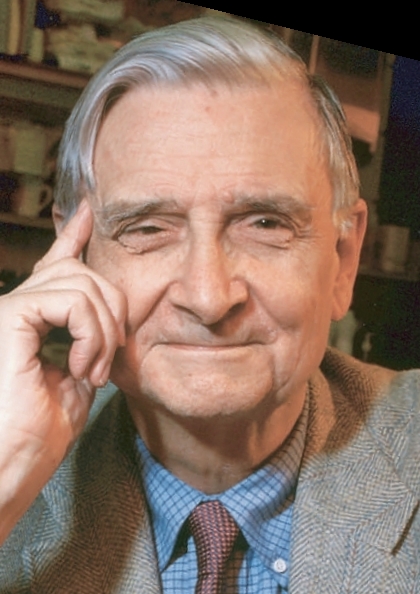“Sosterrò che ogni frammento di diversità biologica è inestimabile.”
Origine: Citato in AA.VV., Il libro dell'ecologia, traduzione di Roberto Sorgo, Gribaudo, 2019, p. 149. ISBN 9788858024362
Edward Osborne Wilson è un biologo statunitense.
Si è occupato di vari temi di ricerca, quali la mirmecologia , la biodiversità e la sua distribuzione, attraverso la formulazione della teoria della biogeografia insulare. È noto in particolare per la fondazione del programma di ricerca della sociobiologia. È autore di numerosi saggi, due dei quali hanno ottenuto il Premio Pulitzer per la saggistica.
Wikipedia

“Sosterrò che ogni frammento di diversità biologica è inestimabile.”
Origine: Citato in AA.VV., Il libro dell'ecologia, traduzione di Roberto Sorgo, Gribaudo, 2019, p. 149. ISBN 9788858024362
Origine: Citato in AA.VV., Il libro dell'ecologia, traduzione di Roberto Sorgo, Gribaudo, 2019, p. 146. ISBN 9788858024362
Origine: Citato in AA.VV., Il libro dell'ecologia, traduzione di Roberto Sorgo, Gribaudo, 2019, p. 148. ISBN 9788858024362
“We have Paleolithic emotions, medieval institutions, and god-like technology.”
Origine: debate at the Harvard Museum of Natural History, Cambridge, Mass., 9 September 2009
Can biology do better than faith?, NewScientist.com, 2 November 2005, 2010-10-26 http://www.newscientist.com/article/dn8254-can-biology-do-better-than-faith.html,
“True character arises from a deeper well than religion.”
Consilience: The Unity of Knowledge (1998)
Contesto: True character arises from a deeper well than religion. It is the internalization of moral principles of a society, augmented by those tenets personally chosen by the individual, strong enough to endure through trials of solitude and adversity. The principles are fitted together into what we call integrity, literally the integrated self, wherein personal decisions feel good and true. Character is in turn the enduring source of virtue. It stands by itself and excites admiration in others. It is not obedience to authority, and while it is often consistent with and reinforced by religious belief, it is not piety.
Origine: Consilience: The Unity of Knowledge (1998), p. 277-278.
Contesto: Few will doubt that humankind has created a planet-sized problem for itself. No one wished it so, but we are the first species to become a geophysical force, altering Earth's climate, a role previously reserved for tectonics, sun flares, and glacial cycles. We are also the greatest destroyer of life since the ten-kilometer-wide meteorite that landed near Yucatan and ended the Age of Reptiles sixty-five million years ago. Through overpopulation we have put ourselves in danger of running out of food and water. So a very Faustian choice is upon us: whether to accept our corrosive and risky behavior as the unavoidable price of population and economic growth, or to take stock of ourselves and search for a new environmental ethic.
“Wonderful theory, wrong species.”
On Marxism, which he considered more suited to ants than to humans.
http://arts.independent.co.uk/books/news/article2886394.ece.
Origine: Consilience: The Unity of Knowledge (1998), p. 294.
“Karl Marx was right, socialism works, it is just that he had the wrong species”
Origine: The Ants
Origine: Consilience: The Unity of Knowledge
“Much of good science — and perhaps all of great science — has its roots in fantasy.”
Origine: Letters to a Young Scientist (2013), chapter 5, "The Creative Process", page 69.
“The mosquito is an automaton. It can afford to be nothing else.”
On Human Nature (1978), Ch.3 Development
http://www.independent.co.uk/news/science/why-richard-dawkins-is-no-scientist-the-survival-of-the-least-selfish-and-what-ants-can-tell-us-about-humans-eo-wilson-on-his-new-book-the-meaning-of-human-existence-9849956.html